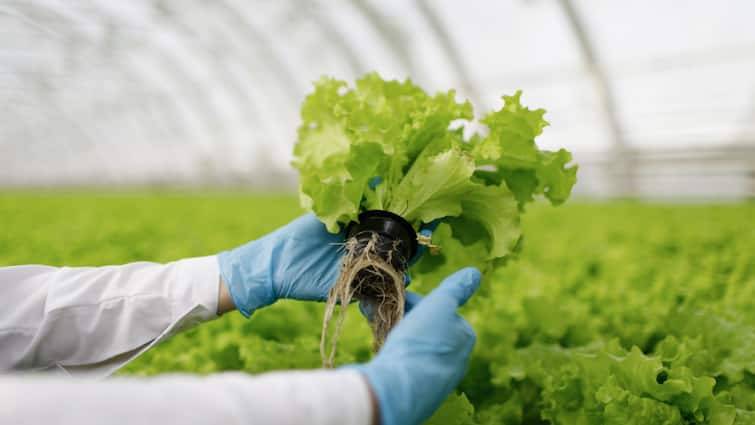Main Points In Hindi (मुख्य बातें – हिंदी में)
-
कृषि का महत्व: भारत की अर्थव्यवस्था कृषि पर आधारित है, जहां 70% जनसंख्या कृषि से प्रत्यक्ष और अप्रत्यक्ष रूप से जुड़ी हुई है। हालांकि, इस क्षेत्र में युवा शक्ति की कमी महसूस की जाती है।
-
बीएससी एग्रीकल्चर कोर्स: 12वीं के बाद चार साल का बीएससी एग्रीकल्चर कोर्स कृषि विज्ञान के विभिन्न विषयों का अध्ययन करता है, जिसमें आवश्यक वैज्ञानिक ज्ञान और तकनीकी अध्ययन शामिल है।
-
रोजगार के अवसर: बीएससी एग्रीकल्चर के बाद विभिन्न क्षेत्रों में करियर के कई विकल्प उपलब्ध हैं, जैसे फॉर्म मैनेजर, एग्रीकल्चरल इंजीनियर, एंटोमॉइडिस्ट, हॉर्टिकल्चरिस्ट, और एग्रीकल्चर रिसर्चर।
-
प्रमुख जॉब प्रोवाइडर: कृषि अनुसंधान केंद्र, राष्ट्रीय बीज निगम, राज्य कृषि विभाग, और केंद्रीय कृषि मंत्रालय जैसे संस्थान प्रमुख नौकरी प्रदाता हैं।
- युवाओं का रुझान: आजकल युवा कृषि क्षेत्र में नौकरी के बजाय अपने स्वयं के कृषि संबंधी व्यवसाय शुरू करने की ओर बढ़ रहे हैं, जो इस क्षेत्र के विकास में सहायक हो सकता है।
Main Points In English(मुख्य बातें – अंग्रेज़ी में)
Here are the main points from the provided text regarding agriculture and education in India:
-
Significance of Agriculture: Agriculture is the primary sector of India’s economy, supporting about 70% of the population directly and indirectly. Despite modernization in various sectors, there is still a notable lack of youth involvement in agriculture.
-
Opportunities in Agricultural Education: There are numerous educational opportunities available in agriculture, including undergraduate and postgraduate courses such as B.Sc. Agriculture. This academic pathway opens up numerous job prospects in both government and private sectors.
-
Details of B.Sc. Agriculture Course: The B.Sc. Agriculture is a four-year program undertaken after completing the 12th grade with a focus on agriculture or biology. It encompasses various agricultural sciences, enabling students to gain in-depth knowledge and practical skills in agricultural technology.
-
Career Opportunities After B.Sc. Agriculture: Graduates can pursue numerous roles such as farm manager, soil scientist, horticulturist, agricultural engineer, and many others within government departments, research centers, and private organizations focused on agriculture.
- Job Providers in Agriculture Sector: Major employers include the Indian Government’s agricultural research centers, the National Seed Corporation, and various state agricultural departments. Additionally, there is a rising trend among youth to start their own agribusinesses rather than seeking traditional employment.


Complete News In Hindi(पूरी खबर – हिंदी में)
<पी शैली="पाठ-संरेखण: औचित्य सिद्ध करें;">भारत की अर्थव्यवस्था का मुख्य भाग खेती-किसानी से शुरू हुआ है। देश की 70% जनसंख्या तो रोजगार के क्षेत्र में प्रत्यक्ष और अप्रत्यक्ष रूप से कृषि से जुड़ी हुई है। विभिन्न क्षेत्रों में विकास और आधुनिकता के साथ-साथ कृषि में भी बदलाव आये हैं। इसके बावजूद आज भी इस क्षेत्र में युवा शक्ति की कमी है, कहा जा सकता है कि युवाओं के लिए यहां पर प्राचीन काल की मूर्तियां रखी जाती हैं।
खास तौर पर अध्ययन और सीट के क्षेत्र में विशेष संभावना है। अगर आप भी किस क्षेत्र में रिलेशनशिप बनाना चाहते हैं तो यह लेख आपके लिए ही है। इसी तरह एग्रीकल्चर में ग्रेजुएशन, पोस्ट-ग्रेजुएशन, एबीएजेड, एबीएसई पाठ्यक्रम उपलब्ध हैं। हम यहां बीएससी एग्रीकल्चर कोर्स की बात करेंगे, जिसके बाद आप सरकारी और प्राइवेट सेक्टर में बेहतरीन जॉब हासिल कर सकते हैं।
क्या है बीएससी एग्रीकल्चर कोर्स
12वीं के बाद एग्रीकल्चर में ग्रेजुएशन के लिए चार साल का कोर्स होता है, इसमें एसएसी बी-एग्रीकल्चर/ बीएससी-एग्रीकल्चर (ऑनर्स) कोर्स कहा जाता है। इसके लिए योग्यता 12वीं एग्रीकल्चर या बायोलॉजी से स्नातक होनी चाहिए। बीएससी एग्रीकल्चर कोर्स में एग्रीकल्चर के विभिन्न विषयों का अध्ययन वैज्ञानिक वैज्ञानिक करते हैं, जिसमें सेम सिस्टम की भूमिका महत्वपूर्ण है। इस दौरान संपूर्ण एग्रीकल्चरल टेक्नोलॉजी के विषयों पर गहन अध्ययन, सांख्यिकीय और पुरातात्विक रूप से जानकारी प्राप्त की जाती है।
कहां-कहां मिलते हैं मौके


बीएससी एग्रीकल्चर के बाद आप फॉर्म मैनेजर, सुपर इंजीनियर, सॉइल साइंटिस्ट, एंटोमॉइडिस्ट, पैथोलोजिस्ट, हॉर्टिकल्चरिस्ट, एग्रोनोमिस्ट, सीजन साइंटिस्ट, एग्रीकल्चरल एक्सपर्ट, एग्रीकल्चरल इंजीनियर, एग्रीकल्चरल कंप्यूटर इंजीनियर, एग्रीकल्चर फूड साइंटिस्ट, एग्रीकल्चर रिसर्चर, एग्रीकल्चर एक्सपर्ट, प्लांट फिजियोलॉजिस्ट, सर्वे रिसर्च एग्रीकल्चर इंजीनियर, एन वोयारमेंटल कंट्रोल्स इंजीनियर, माइक्रोबायोलॉजिकल इंजीनियर, फूड सुपर होल्डर, रिसर्चर, एग्रीकल्चर क्रॉप इंजीनियर, बी कीपर, फिशरी मैनेजर, बोटेनिस्ट, सोयल इंजीनियर, सोयल एंड प्लांट सेंटिस्ट, लेब टेक्निशियन और मीडिया मैनेजर आदि के रूप में रोजगार प्राप्त कर सकते हैं।
ये हैं प्रमुख जॉब प्रोवाइडर
भारत सरकार के कृषि अनुसंधान केंद्र, अनुसंधान केंद्र, अनुसंधान केंद्र, राष्ट्रीय बीज निगम, केंद्रीय कृषि विभाग मंत्रालय और कृषि विभाग, राज्य कृषि के सभी अनुसंधान केंद्र और राज्य कृषि विभाग, कृषि विज्ञान केंद्र विभाग मंत्रालय एवं विभाग, जल एवं पर्यावरण मंत्रालय, मौसम विभाग आदि प्रमुख हैं। वहीं, आज कल युवा नौकरी के स्थान पर अपने उत्पाद और कृषि से जुड़े बिजनेस को शुरू करने जा रहे हैं।
Complete News In English(पूरी खबर – अंग्रेज़ी में)
India’s economy has its roots in agriculture, with about 70% of the population directly or indirectly dependent on this sector for employment. Over the years, there have been changes and advancements in agriculture due to developments in various fields. However, there is still a lack of youth involvement in this area; it can be said that young people are often directed towards more traditional roles in agriculture.
There is significant potential in the study of agriculture and related fields. If you are interested in establishing a career in this area, this article is for you. In agriculture, various degree programs such as graduation, post-graduation, and certificates like ABZ and ABSE are available. In particular, we will discuss the B.Sc. in Agriculture course, which can lead to excellent job opportunities in both government and private sectors.
What is the B.Sc. in Agriculture Course?
After completing the 12th grade, students can enroll in a four-year B.Sc. in Agriculture course. This includes specializations like B.Sc. Agriculture / B.Sc. Agriculture (Honors). To qualify, students should have completed their 12th grade in Agriculture or Biology. The B.Sc. Agriculture course covers various subjects related to agriculture, with a strong emphasis on scientific principles and methods. During the course, students gain in-depth knowledge about agricultural technology and its practical applications.
Job Opportunities After B.Sc. in Agriculture
After completing the B.Sc. in Agriculture, graduates can pursue careers as Farm Managers, Super Engineers, Soil Scientists, Entomologists, Pathologists, Horticulturists, Agronomists, Seasonal Scientists, Agricultural Experts, Agricultural Engineers, Computer Engineers in Agriculture, Food Scientists, Agricultural Researchers, Plant Physiologists, Survey Research Agricultural Engineers, Environmental Control Engineers, Microbiological Engineers, Food Supervisors, Researchers, Crop Engineers, Beekeepers, Fishery Managers, Botanists, Soil Engineers, and Laboratory Technicians, among others.
Major Job Providers
Key organizations offering jobs include the Government of India’s Agricultural Research Centers, National Seed Corporation, Central Ministry of Agriculture, State Agricultural Departments, and various research institutions focused on agriculture. Many young people are also beginning to start their own businesses related to agriculture and its products instead of seeking traditional jobs.








